Finance Research Proposal: Capital Budgeting and Oil Prices
VerifiedAdded on 2023/03/20
|9
|2826
|36
Project
AI Summary
This research proposal investigates the impact of crude oil price volatility on the capital budgeting decisions of Aramco Saudi. The study aims to determine the effects of oil price fluctuations on Aramco's budgets, identify the applied capital budgeting techniques, and assess the effectiveness of these methods in achieving the company's 2020 vision. The research employs a mixed-methods approach, utilizing both qualitative and quantitative data collection techniques. Data sources include financial statements, public strategic vision documents, and in-depth interviews with eight managers involved in capital budgeting. The research questions address the potential effects of oil price volatility, the applied capital budgeting techniques, managerial project evaluation processes, and the effectiveness of current methods. The methodology includes a pilot study, validity and reliability tests, and thematic analysis of interview data using Atlas.ti. The analysis will involve the use of financial ratios (Return on Capital, Return on Equity) and a multiple regression test. The study is designed to provide insights into the challenges and opportunities faced by petroleum companies in the context of fluctuating oil prices and inform strategic decision-making.
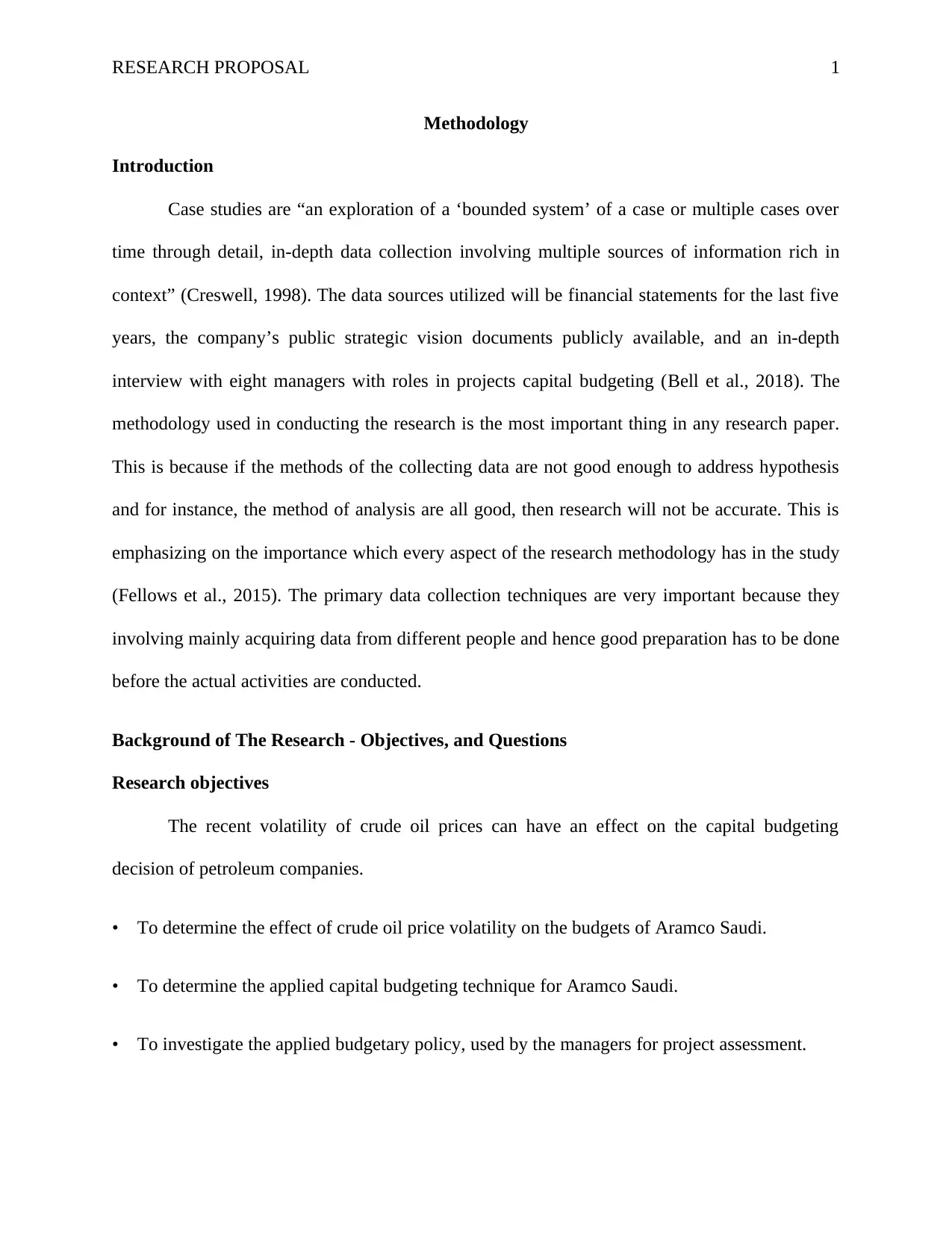
RESEARCH PROPOSAL 1
Methodology
Introduction
Case studies are “an exploration of a ‘bounded system’ of a case or multiple cases over
time through detail, in-depth data collection involving multiple sources of information rich in
context” (Creswell, 1998). The data sources utilized will be financial statements for the last five
years, the company’s public strategic vision documents publicly available, and an in-depth
interview with eight managers with roles in projects capital budgeting (Bell et al., 2018). The
methodology used in conducting the research is the most important thing in any research paper.
This is because if the methods of the collecting data are not good enough to address hypothesis
and for instance, the method of analysis are all good, then research will not be accurate. This is
emphasizing on the importance which every aspect of the research methodology has in the study
(Fellows et al., 2015). The primary data collection techniques are very important because they
involving mainly acquiring data from different people and hence good preparation has to be done
before the actual activities are conducted.
Background of The Research - Objectives, and Questions
Research objectives
The recent volatility of crude oil prices can have an effect on the capital budgeting
decision of petroleum companies.
• To determine the effect of crude oil price volatility on the budgets of Aramco Saudi.
• To determine the applied capital budgeting technique for Aramco Saudi.
• To investigate the applied budgetary policy, used by the managers for project assessment.
Methodology
Introduction
Case studies are “an exploration of a ‘bounded system’ of a case or multiple cases over
time through detail, in-depth data collection involving multiple sources of information rich in
context” (Creswell, 1998). The data sources utilized will be financial statements for the last five
years, the company’s public strategic vision documents publicly available, and an in-depth
interview with eight managers with roles in projects capital budgeting (Bell et al., 2018). The
methodology used in conducting the research is the most important thing in any research paper.
This is because if the methods of the collecting data are not good enough to address hypothesis
and for instance, the method of analysis are all good, then research will not be accurate. This is
emphasizing on the importance which every aspect of the research methodology has in the study
(Fellows et al., 2015). The primary data collection techniques are very important because they
involving mainly acquiring data from different people and hence good preparation has to be done
before the actual activities are conducted.
Background of The Research - Objectives, and Questions
Research objectives
The recent volatility of crude oil prices can have an effect on the capital budgeting
decision of petroleum companies.
• To determine the effect of crude oil price volatility on the budgets of Aramco Saudi.
• To determine the applied capital budgeting technique for Aramco Saudi.
• To investigate the applied budgetary policy, used by the managers for project assessment.
Paraphrase This Document
Need a fresh take? Get an instant paraphrase of this document with our AI Paraphraser
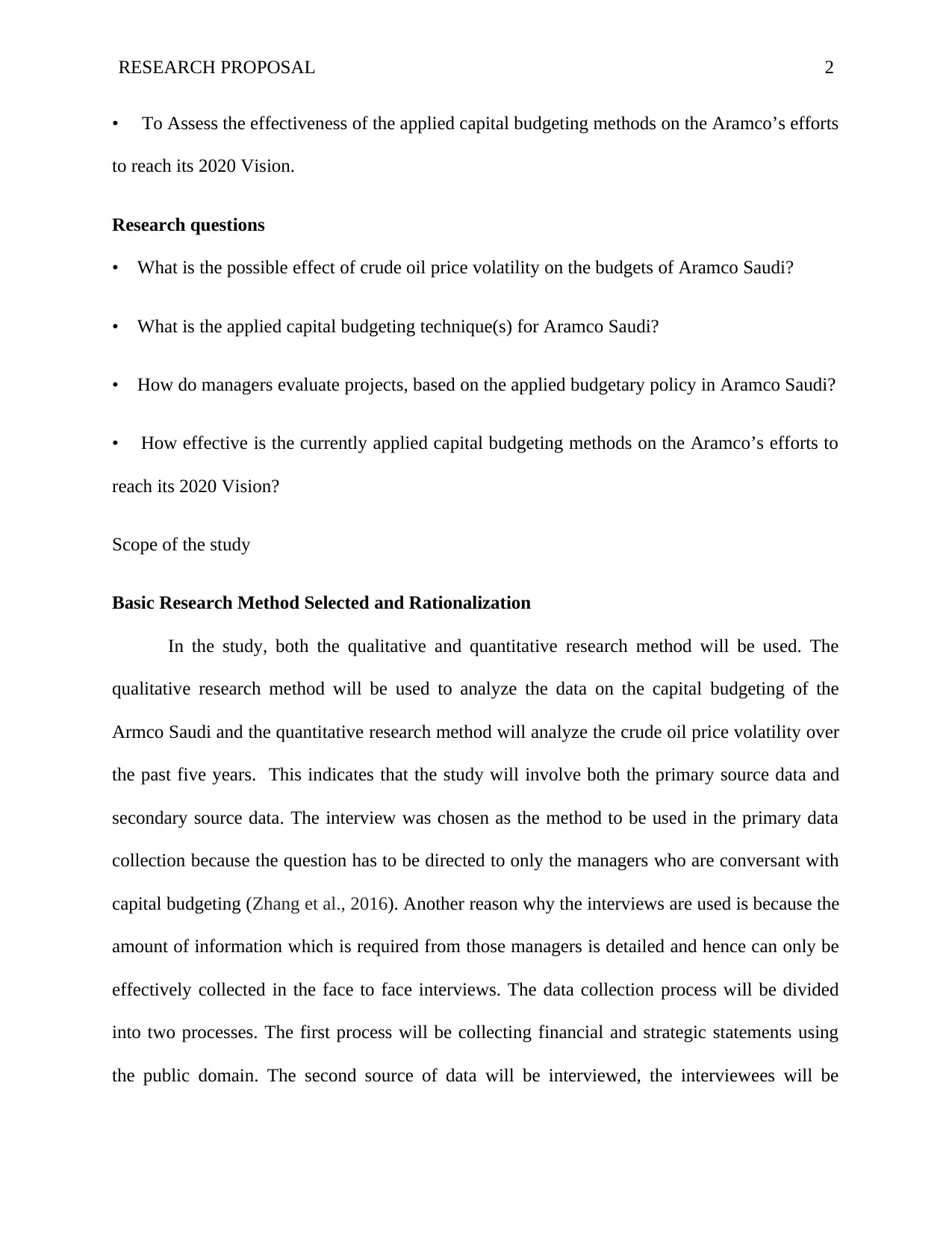
RESEARCH PROPOSAL 2
• To Assess the effectiveness of the applied capital budgeting methods on the Aramco’s efforts
to reach its 2020 Vision.
Research questions
• What is the possible effect of crude oil price volatility on the budgets of Aramco Saudi?
• What is the applied capital budgeting technique(s) for Aramco Saudi?
• How do managers evaluate projects, based on the applied budgetary policy in Aramco Saudi?
• How effective is the currently applied capital budgeting methods on the Aramco’s efforts to
reach its 2020 Vision?
Scope of the study
Basic Research Method Selected and Rationalization
In the study, both the qualitative and quantitative research method will be used. The
qualitative research method will be used to analyze the data on the capital budgeting of the
Armco Saudi and the quantitative research method will analyze the crude oil price volatility over
the past five years. This indicates that the study will involve both the primary source data and
secondary source data. The interview was chosen as the method to be used in the primary data
collection because the question has to be directed to only the managers who are conversant with
capital budgeting (Zhang et al., 2016). Another reason why the interviews are used is because the
amount of information which is required from those managers is detailed and hence can only be
effectively collected in the face to face interviews. The data collection process will be divided
into two processes. The first process will be collecting financial and strategic statements using
the public domain. The second source of data will be interviewed, the interviewees will be
• To Assess the effectiveness of the applied capital budgeting methods on the Aramco’s efforts
to reach its 2020 Vision.
Research questions
• What is the possible effect of crude oil price volatility on the budgets of Aramco Saudi?
• What is the applied capital budgeting technique(s) for Aramco Saudi?
• How do managers evaluate projects, based on the applied budgetary policy in Aramco Saudi?
• How effective is the currently applied capital budgeting methods on the Aramco’s efforts to
reach its 2020 Vision?
Scope of the study
Basic Research Method Selected and Rationalization
In the study, both the qualitative and quantitative research method will be used. The
qualitative research method will be used to analyze the data on the capital budgeting of the
Armco Saudi and the quantitative research method will analyze the crude oil price volatility over
the past five years. This indicates that the study will involve both the primary source data and
secondary source data. The interview was chosen as the method to be used in the primary data
collection because the question has to be directed to only the managers who are conversant with
capital budgeting (Zhang et al., 2016). Another reason why the interviews are used is because the
amount of information which is required from those managers is detailed and hence can only be
effectively collected in the face to face interviews. The data collection process will be divided
into two processes. The first process will be collecting financial and strategic statements using
the public domain. The second source of data will be interviewed, the interviewees will be
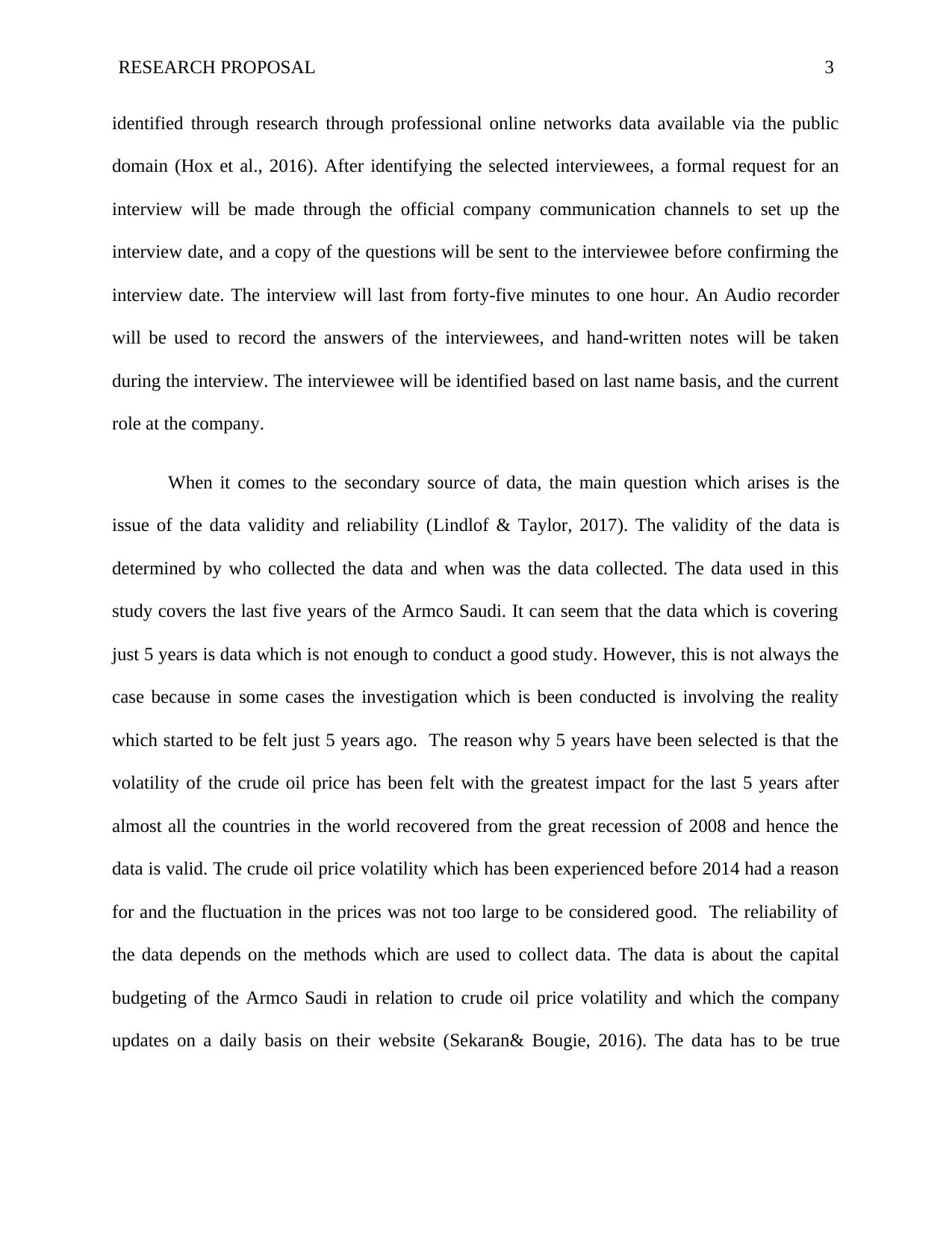
RESEARCH PROPOSAL 3
identified through research through professional online networks data available via the public
domain (Hox et al., 2016). After identifying the selected interviewees, a formal request for an
interview will be made through the official company communication channels to set up the
interview date, and a copy of the questions will be sent to the interviewee before confirming the
interview date. The interview will last from forty-five minutes to one hour. An Audio recorder
will be used to record the answers of the interviewees, and hand-written notes will be taken
during the interview. The interviewee will be identified based on last name basis, and the current
role at the company.
When it comes to the secondary source of data, the main question which arises is the
issue of the data validity and reliability (Lindlof & Taylor, 2017). The validity of the data is
determined by who collected the data and when was the data collected. The data used in this
study covers the last five years of the Armco Saudi. It can seem that the data which is covering
just 5 years is data which is not enough to conduct a good study. However, this is not always the
case because in some cases the investigation which is been conducted is involving the reality
which started to be felt just 5 years ago. The reason why 5 years have been selected is that the
volatility of the crude oil price has been felt with the greatest impact for the last 5 years after
almost all the countries in the world recovered from the great recession of 2008 and hence the
data is valid. The crude oil price volatility which has been experienced before 2014 had a reason
for and the fluctuation in the prices was not too large to be considered good. The reliability of
the data depends on the methods which are used to collect data. The data is about the capital
budgeting of the Armco Saudi in relation to crude oil price volatility and which the company
updates on a daily basis on their website (Sekaran& Bougie, 2016). The data has to be true
identified through research through professional online networks data available via the public
domain (Hox et al., 2016). After identifying the selected interviewees, a formal request for an
interview will be made through the official company communication channels to set up the
interview date, and a copy of the questions will be sent to the interviewee before confirming the
interview date. The interview will last from forty-five minutes to one hour. An Audio recorder
will be used to record the answers of the interviewees, and hand-written notes will be taken
during the interview. The interviewee will be identified based on last name basis, and the current
role at the company.
When it comes to the secondary source of data, the main question which arises is the
issue of the data validity and reliability (Lindlof & Taylor, 2017). The validity of the data is
determined by who collected the data and when was the data collected. The data used in this
study covers the last five years of the Armco Saudi. It can seem that the data which is covering
just 5 years is data which is not enough to conduct a good study. However, this is not always the
case because in some cases the investigation which is been conducted is involving the reality
which started to be felt just 5 years ago. The reason why 5 years have been selected is that the
volatility of the crude oil price has been felt with the greatest impact for the last 5 years after
almost all the countries in the world recovered from the great recession of 2008 and hence the
data is valid. The crude oil price volatility which has been experienced before 2014 had a reason
for and the fluctuation in the prices was not too large to be considered good. The reliability of
the data depends on the methods which are used to collect data. The data is about the capital
budgeting of the Armco Saudi in relation to crude oil price volatility and which the company
updates on a daily basis on their website (Sekaran& Bougie, 2016). The data has to be true
⊘ This is a preview!⊘
Do you want full access?
Subscribe today to unlock all pages.

Trusted by 1+ million students worldwide
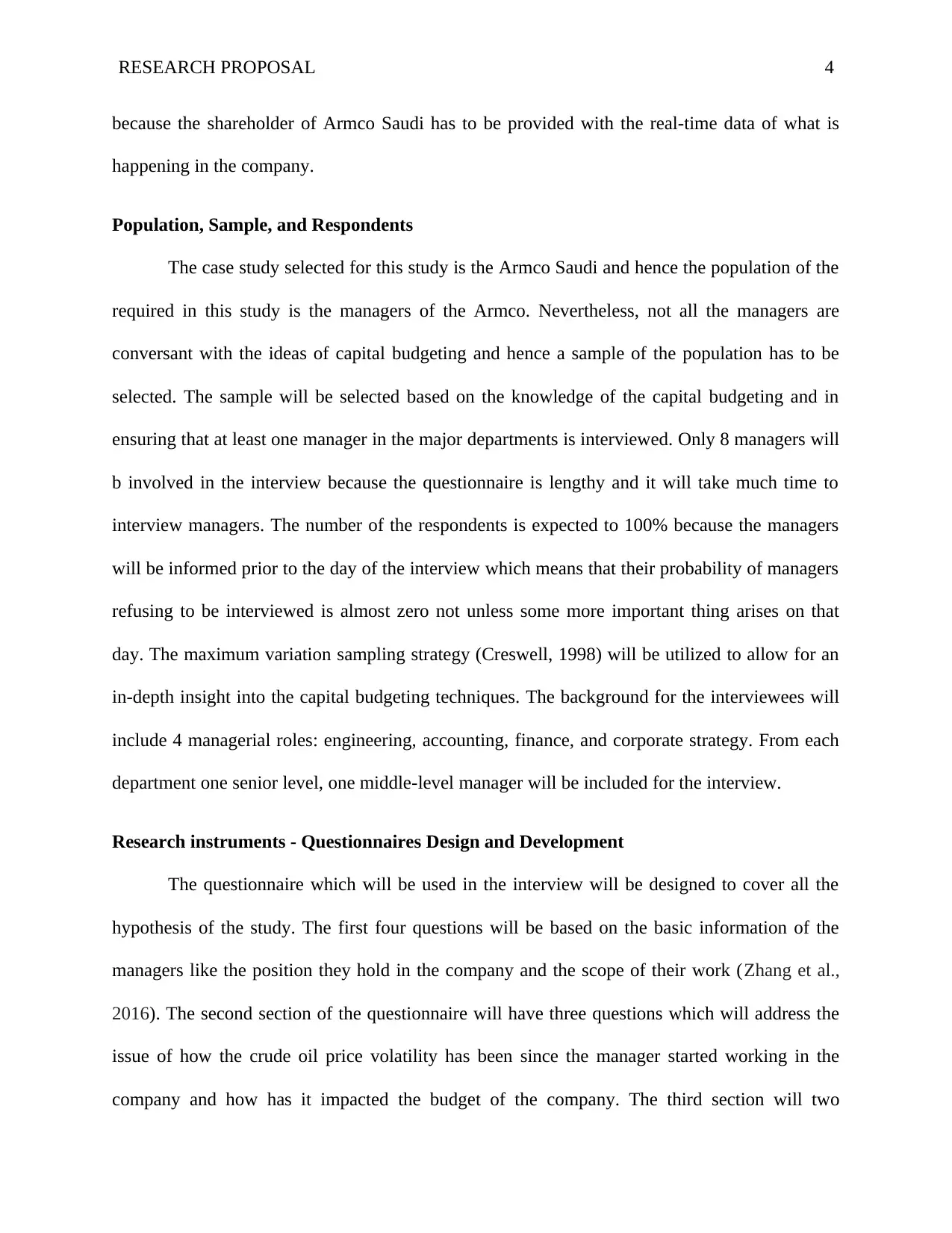
RESEARCH PROPOSAL 4
because the shareholder of Armco Saudi has to be provided with the real-time data of what is
happening in the company.
Population, Sample, and Respondents
The case study selected for this study is the Armco Saudi and hence the population of the
required in this study is the managers of the Armco. Nevertheless, not all the managers are
conversant with the ideas of capital budgeting and hence a sample of the population has to be
selected. The sample will be selected based on the knowledge of the capital budgeting and in
ensuring that at least one manager in the major departments is interviewed. Only 8 managers will
b involved in the interview because the questionnaire is lengthy and it will take much time to
interview managers. The number of the respondents is expected to 100% because the managers
will be informed prior to the day of the interview which means that their probability of managers
refusing to be interviewed is almost zero not unless some more important thing arises on that
day. The maximum variation sampling strategy (Creswell, 1998) will be utilized to allow for an
in-depth insight into the capital budgeting techniques. The background for the interviewees will
include 4 managerial roles: engineering, accounting, finance, and corporate strategy. From each
department one senior level, one middle-level manager will be included for the interview.
Research instruments - Questionnaires Design and Development
The questionnaire which will be used in the interview will be designed to cover all the
hypothesis of the study. The first four questions will be based on the basic information of the
managers like the position they hold in the company and the scope of their work (Zhang et al.,
2016). The second section of the questionnaire will have three questions which will address the
issue of how the crude oil price volatility has been since the manager started working in the
company and how has it impacted the budget of the company. The third section will two
because the shareholder of Armco Saudi has to be provided with the real-time data of what is
happening in the company.
Population, Sample, and Respondents
The case study selected for this study is the Armco Saudi and hence the population of the
required in this study is the managers of the Armco. Nevertheless, not all the managers are
conversant with the ideas of capital budgeting and hence a sample of the population has to be
selected. The sample will be selected based on the knowledge of the capital budgeting and in
ensuring that at least one manager in the major departments is interviewed. Only 8 managers will
b involved in the interview because the questionnaire is lengthy and it will take much time to
interview managers. The number of the respondents is expected to 100% because the managers
will be informed prior to the day of the interview which means that their probability of managers
refusing to be interviewed is almost zero not unless some more important thing arises on that
day. The maximum variation sampling strategy (Creswell, 1998) will be utilized to allow for an
in-depth insight into the capital budgeting techniques. The background for the interviewees will
include 4 managerial roles: engineering, accounting, finance, and corporate strategy. From each
department one senior level, one middle-level manager will be included for the interview.
Research instruments - Questionnaires Design and Development
The questionnaire which will be used in the interview will be designed to cover all the
hypothesis of the study. The first four questions will be based on the basic information of the
managers like the position they hold in the company and the scope of their work (Zhang et al.,
2016). The second section of the questionnaire will have three questions which will address the
issue of how the crude oil price volatility has been since the manager started working in the
company and how has it impacted the budget of the company. The third section will two
Paraphrase This Document
Need a fresh take? Get an instant paraphrase of this document with our AI Paraphraser
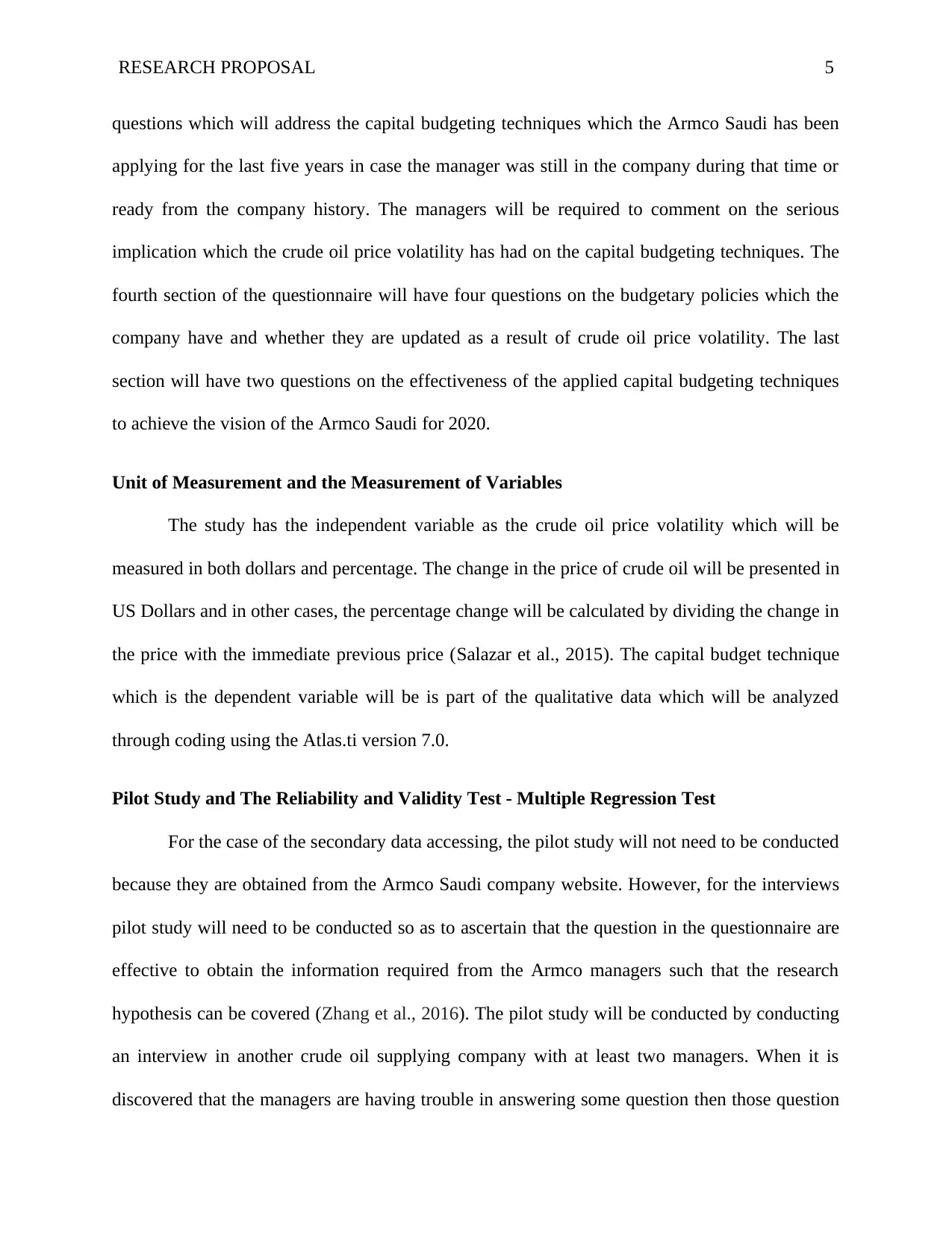
RESEARCH PROPOSAL 5
questions which will address the capital budgeting techniques which the Armco Saudi has been
applying for the last five years in case the manager was still in the company during that time or
ready from the company history. The managers will be required to comment on the serious
implication which the crude oil price volatility has had on the capital budgeting techniques. The
fourth section of the questionnaire will have four questions on the budgetary policies which the
company have and whether they are updated as a result of crude oil price volatility. The last
section will have two questions on the effectiveness of the applied capital budgeting techniques
to achieve the vision of the Armco Saudi for 2020.
Unit of Measurement and the Measurement of Variables
The study has the independent variable as the crude oil price volatility which will be
measured in both dollars and percentage. The change in the price of crude oil will be presented in
US Dollars and in other cases, the percentage change will be calculated by dividing the change in
the price with the immediate previous price (Salazar et al., 2015). The capital budget technique
which is the dependent variable will be is part of the qualitative data which will be analyzed
through coding using the Atlas.ti version 7.0.
Pilot Study and The Reliability and Validity Test - Multiple Regression Test
For the case of the secondary data accessing, the pilot study will not need to be conducted
because they are obtained from the Armco Saudi company website. However, for the interviews
pilot study will need to be conducted so as to ascertain that the question in the questionnaire are
effective to obtain the information required from the Armco managers such that the research
hypothesis can be covered (Zhang et al., 2016). The pilot study will be conducted by conducting
an interview in another crude oil supplying company with at least two managers. When it is
discovered that the managers are having trouble in answering some question then those question
questions which will address the capital budgeting techniques which the Armco Saudi has been
applying for the last five years in case the manager was still in the company during that time or
ready from the company history. The managers will be required to comment on the serious
implication which the crude oil price volatility has had on the capital budgeting techniques. The
fourth section of the questionnaire will have four questions on the budgetary policies which the
company have and whether they are updated as a result of crude oil price volatility. The last
section will have two questions on the effectiveness of the applied capital budgeting techniques
to achieve the vision of the Armco Saudi for 2020.
Unit of Measurement and the Measurement of Variables
The study has the independent variable as the crude oil price volatility which will be
measured in both dollars and percentage. The change in the price of crude oil will be presented in
US Dollars and in other cases, the percentage change will be calculated by dividing the change in
the price with the immediate previous price (Salazar et al., 2015). The capital budget technique
which is the dependent variable will be is part of the qualitative data which will be analyzed
through coding using the Atlas.ti version 7.0.
Pilot Study and The Reliability and Validity Test - Multiple Regression Test
For the case of the secondary data accessing, the pilot study will not need to be conducted
because they are obtained from the Armco Saudi company website. However, for the interviews
pilot study will need to be conducted so as to ascertain that the question in the questionnaire are
effective to obtain the information required from the Armco managers such that the research
hypothesis can be covered (Zhang et al., 2016). The pilot study will be conducted by conducting
an interview in another crude oil supplying company with at least two managers. When it is
discovered that the managers are having trouble in answering some question then those question
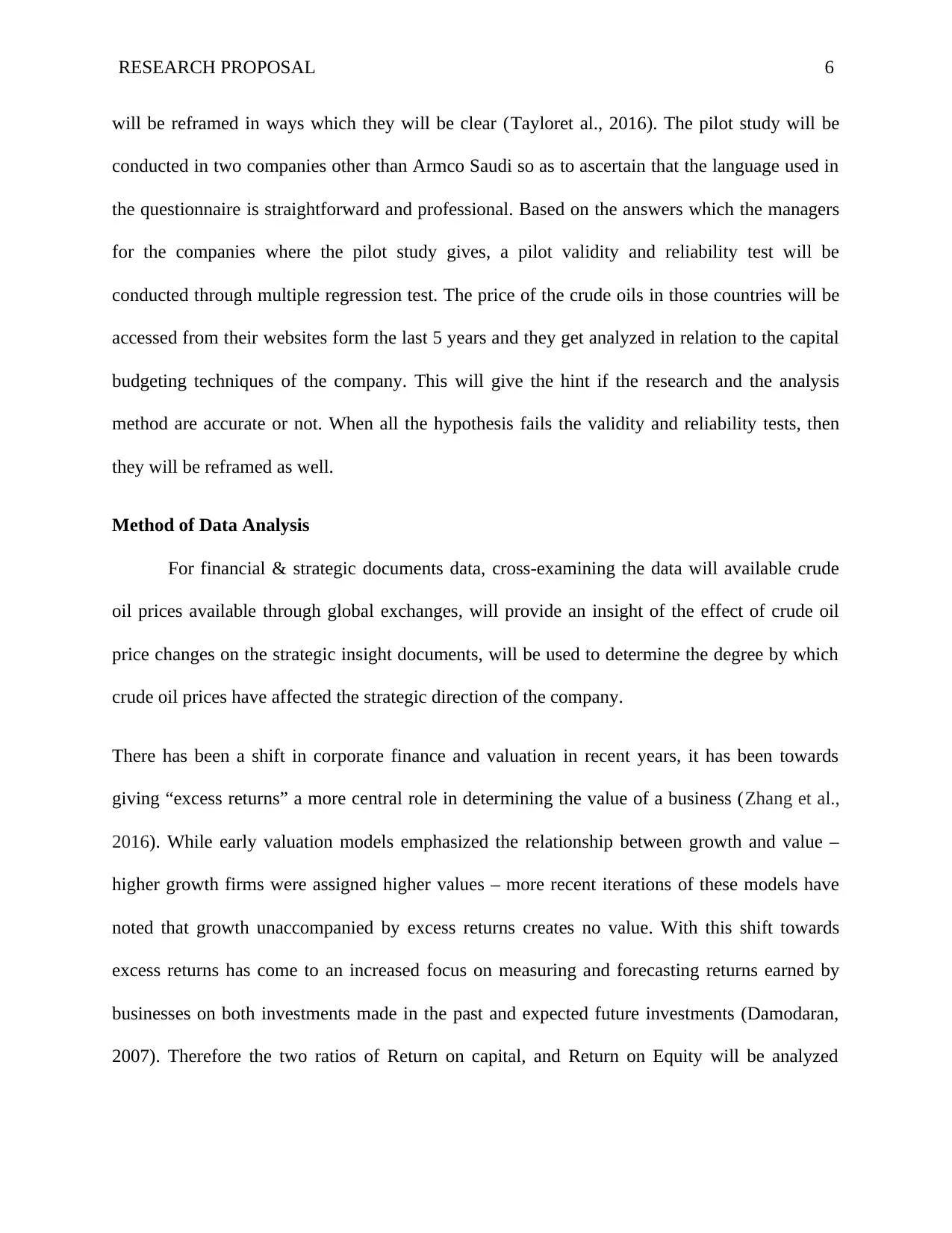
RESEARCH PROPOSAL 6
will be reframed in ways which they will be clear (Tayloret al., 2016). The pilot study will be
conducted in two companies other than Armco Saudi so as to ascertain that the language used in
the questionnaire is straightforward and professional. Based on the answers which the managers
for the companies where the pilot study gives, a pilot validity and reliability test will be
conducted through multiple regression test. The price of the crude oils in those countries will be
accessed from their websites form the last 5 years and they get analyzed in relation to the capital
budgeting techniques of the company. This will give the hint if the research and the analysis
method are accurate or not. When all the hypothesis fails the validity and reliability tests, then
they will be reframed as well.
Method of Data Analysis
For financial & strategic documents data, cross-examining the data will available crude
oil prices available through global exchanges, will provide an insight of the effect of crude oil
price changes on the strategic insight documents, will be used to determine the degree by which
crude oil prices have affected the strategic direction of the company.
There has been a shift in corporate finance and valuation in recent years, it has been towards
giving “excess returns” a more central role in determining the value of a business (Zhang et al.,
2016). While early valuation models emphasized the relationship between growth and value –
higher growth firms were assigned higher values – more recent iterations of these models have
noted that growth unaccompanied by excess returns creates no value. With this shift towards
excess returns has come to an increased focus on measuring and forecasting returns earned by
businesses on both investments made in the past and expected future investments (Damodaran,
2007). Therefore the two ratios of Return on capital, and Return on Equity will be analyzed
will be reframed in ways which they will be clear (Tayloret al., 2016). The pilot study will be
conducted in two companies other than Armco Saudi so as to ascertain that the language used in
the questionnaire is straightforward and professional. Based on the answers which the managers
for the companies where the pilot study gives, a pilot validity and reliability test will be
conducted through multiple regression test. The price of the crude oils in those countries will be
accessed from their websites form the last 5 years and they get analyzed in relation to the capital
budgeting techniques of the company. This will give the hint if the research and the analysis
method are accurate or not. When all the hypothesis fails the validity and reliability tests, then
they will be reframed as well.
Method of Data Analysis
For financial & strategic documents data, cross-examining the data will available crude
oil prices available through global exchanges, will provide an insight of the effect of crude oil
price changes on the strategic insight documents, will be used to determine the degree by which
crude oil prices have affected the strategic direction of the company.
There has been a shift in corporate finance and valuation in recent years, it has been towards
giving “excess returns” a more central role in determining the value of a business (Zhang et al.,
2016). While early valuation models emphasized the relationship between growth and value –
higher growth firms were assigned higher values – more recent iterations of these models have
noted that growth unaccompanied by excess returns creates no value. With this shift towards
excess returns has come to an increased focus on measuring and forecasting returns earned by
businesses on both investments made in the past and expected future investments (Damodaran,
2007). Therefore the two ratios of Return on capital, and Return on Equity will be analyzed
⊘ This is a preview!⊘
Do you want full access?
Subscribe today to unlock all pages.

Trusted by 1+ million students worldwide
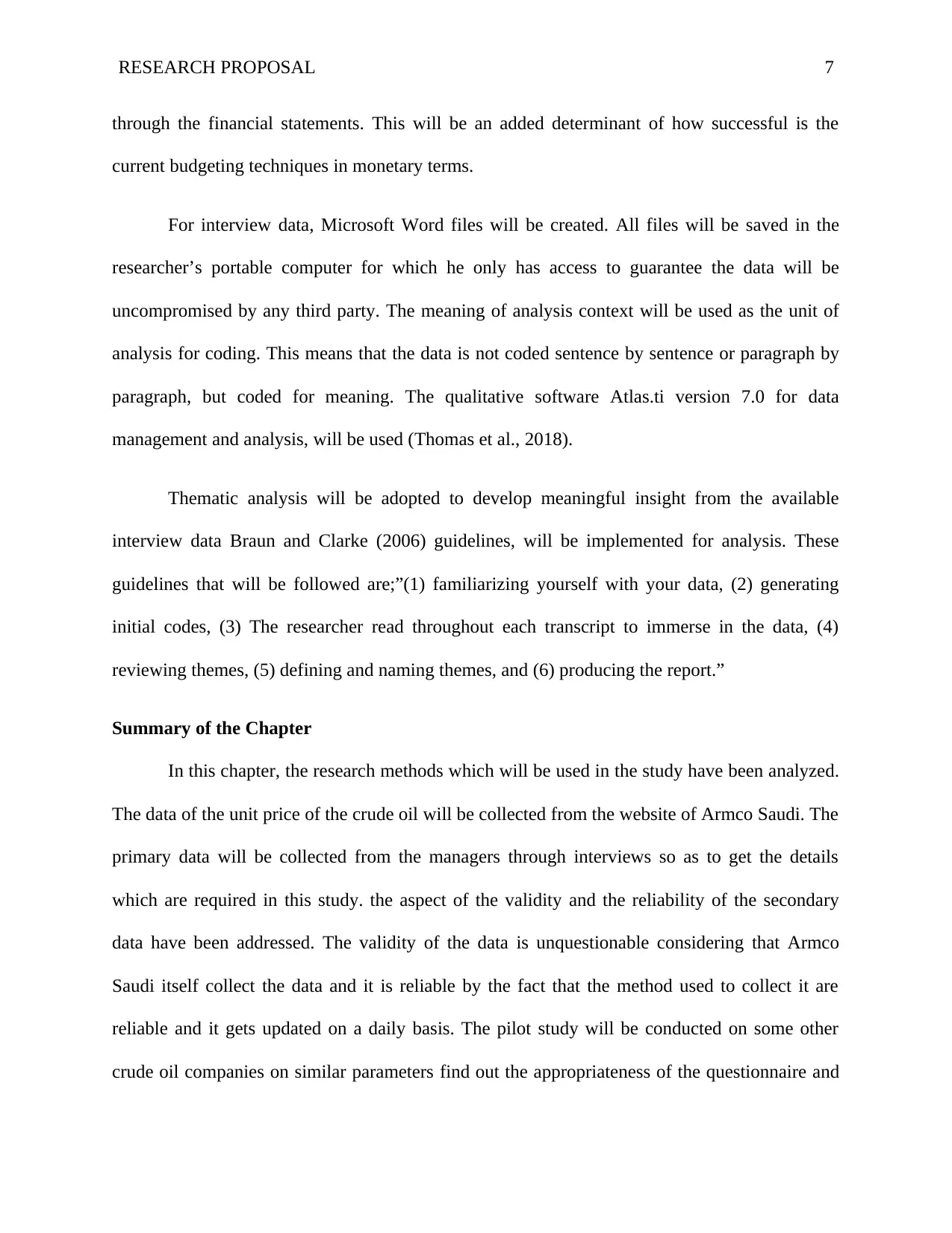
RESEARCH PROPOSAL 7
through the financial statements. This will be an added determinant of how successful is the
current budgeting techniques in monetary terms.
For interview data, Microsoft Word files will be created. All files will be saved in the
researcher’s portable computer for which he only has access to guarantee the data will be
uncompromised by any third party. The meaning of analysis context will be used as the unit of
analysis for coding. This means that the data is not coded sentence by sentence or paragraph by
paragraph, but coded for meaning. The qualitative software Atlas.ti version 7.0 for data
management and analysis, will be used (Thomas et al., 2018).
Thematic analysis will be adopted to develop meaningful insight from the available
interview data Braun and Clarke (2006) guidelines, will be implemented for analysis. These
guidelines that will be followed are;”(1) familiarizing yourself with your data, (2) generating
initial codes, (3) The researcher read throughout each transcript to immerse in the data, (4)
reviewing themes, (5) defining and naming themes, and (6) producing the report.”
Summary of the Chapter
In this chapter, the research methods which will be used in the study have been analyzed.
The data of the unit price of the crude oil will be collected from the website of Armco Saudi. The
primary data will be collected from the managers through interviews so as to get the details
which are required in this study. the aspect of the validity and the reliability of the secondary
data have been addressed. The validity of the data is unquestionable considering that Armco
Saudi itself collect the data and it is reliable by the fact that the method used to collect it are
reliable and it gets updated on a daily basis. The pilot study will be conducted on some other
crude oil companies on similar parameters find out the appropriateness of the questionnaire and
through the financial statements. This will be an added determinant of how successful is the
current budgeting techniques in monetary terms.
For interview data, Microsoft Word files will be created. All files will be saved in the
researcher’s portable computer for which he only has access to guarantee the data will be
uncompromised by any third party. The meaning of analysis context will be used as the unit of
analysis for coding. This means that the data is not coded sentence by sentence or paragraph by
paragraph, but coded for meaning. The qualitative software Atlas.ti version 7.0 for data
management and analysis, will be used (Thomas et al., 2018).
Thematic analysis will be adopted to develop meaningful insight from the available
interview data Braun and Clarke (2006) guidelines, will be implemented for analysis. These
guidelines that will be followed are;”(1) familiarizing yourself with your data, (2) generating
initial codes, (3) The researcher read throughout each transcript to immerse in the data, (4)
reviewing themes, (5) defining and naming themes, and (6) producing the report.”
Summary of the Chapter
In this chapter, the research methods which will be used in the study have been analyzed.
The data of the unit price of the crude oil will be collected from the website of Armco Saudi. The
primary data will be collected from the managers through interviews so as to get the details
which are required in this study. the aspect of the validity and the reliability of the secondary
data have been addressed. The validity of the data is unquestionable considering that Armco
Saudi itself collect the data and it is reliable by the fact that the method used to collect it are
reliable and it gets updated on a daily basis. The pilot study will be conducted on some other
crude oil companies on similar parameters find out the appropriateness of the questionnaire and
Paraphrase This Document
Need a fresh take? Get an instant paraphrase of this document with our AI Paraphraser
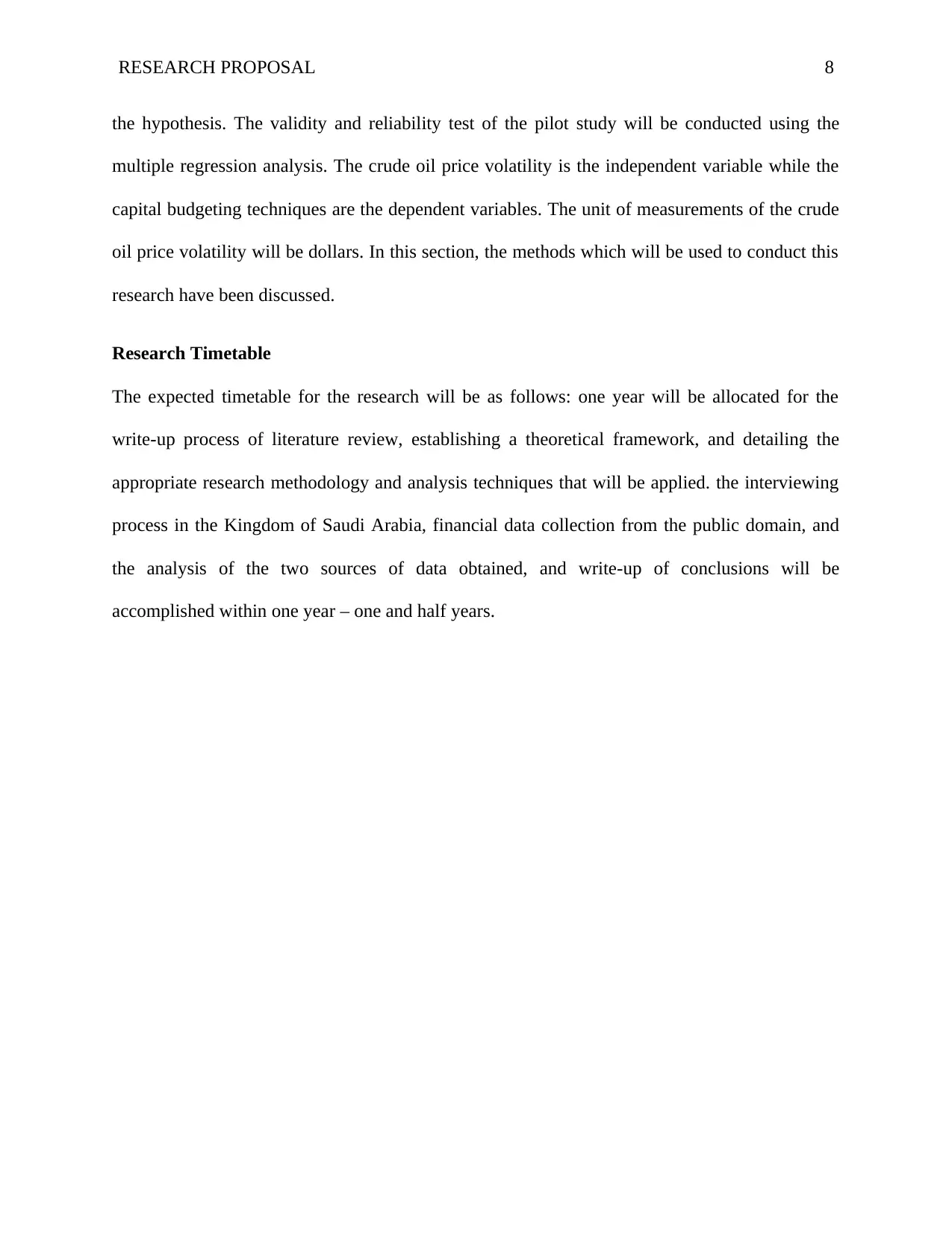
RESEARCH PROPOSAL 8
the hypothesis. The validity and reliability test of the pilot study will be conducted using the
multiple regression analysis. The crude oil price volatility is the independent variable while the
capital budgeting techniques are the dependent variables. The unit of measurements of the crude
oil price volatility will be dollars. In this section, the methods which will be used to conduct this
research have been discussed.
Research Timetable
The expected timetable for the research will be as follows: one year will be allocated for the
write-up process of literature review, establishing a theoretical framework, and detailing the
appropriate research methodology and analysis techniques that will be applied. the interviewing
process in the Kingdom of Saudi Arabia, financial data collection from the public domain, and
the analysis of the two sources of data obtained, and write-up of conclusions will be
accomplished within one year – one and half years.
the hypothesis. The validity and reliability test of the pilot study will be conducted using the
multiple regression analysis. The crude oil price volatility is the independent variable while the
capital budgeting techniques are the dependent variables. The unit of measurements of the crude
oil price volatility will be dollars. In this section, the methods which will be used to conduct this
research have been discussed.
Research Timetable
The expected timetable for the research will be as follows: one year will be allocated for the
write-up process of literature review, establishing a theoretical framework, and detailing the
appropriate research methodology and analysis techniques that will be applied. the interviewing
process in the Kingdom of Saudi Arabia, financial data collection from the public domain, and
the analysis of the two sources of data obtained, and write-up of conclusions will be
accomplished within one year – one and half years.
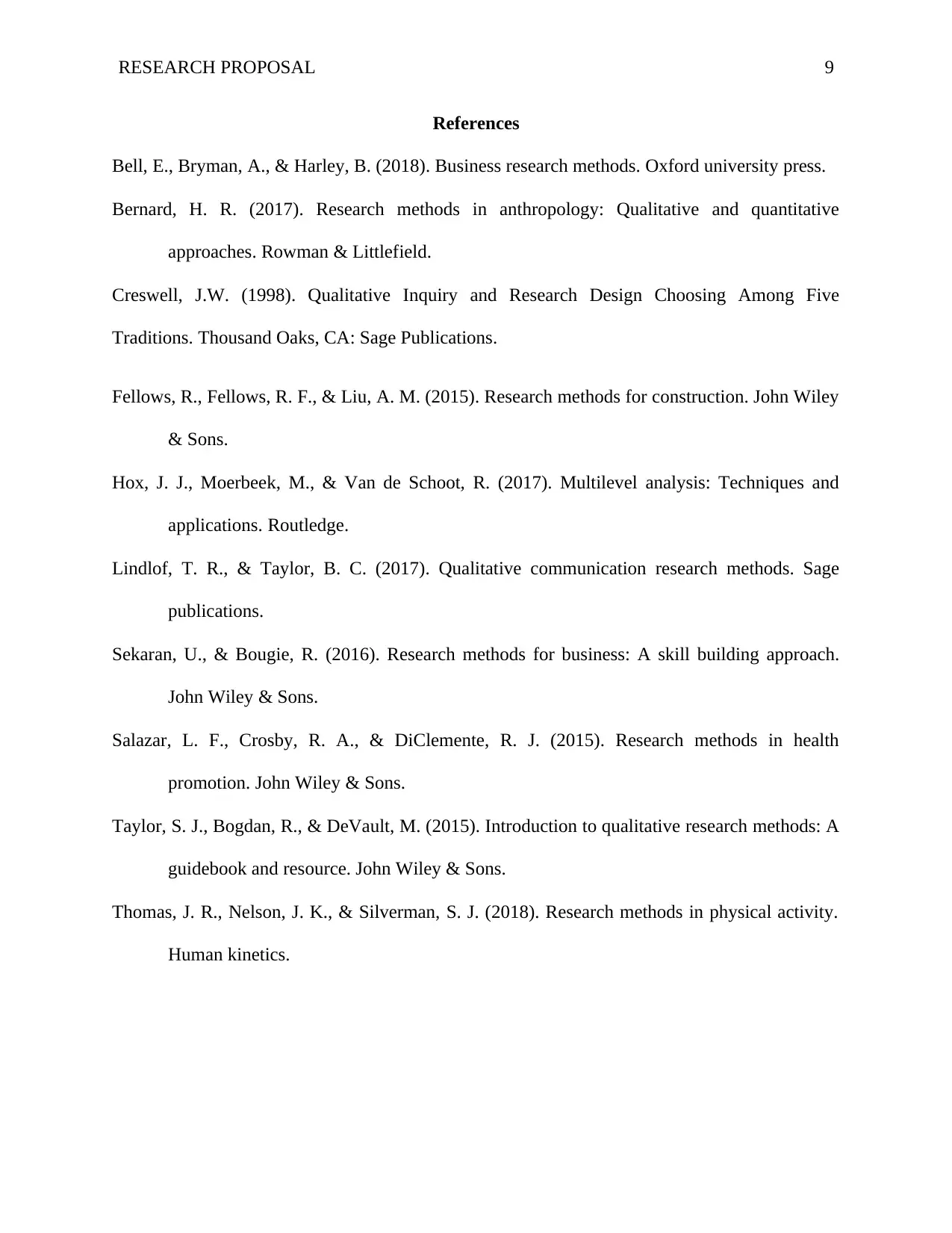
RESEARCH PROPOSAL 9
References
Bell, E., Bryman, A., & Harley, B. (2018). Business research methods. Oxford university press.
Bernard, H. R. (2017). Research methods in anthropology: Qualitative and quantitative
approaches. Rowman & Littlefield.
Creswell, J.W. (1998). Qualitative Inquiry and Research Design Choosing Among Five
Traditions. Thousand Oaks, CA: Sage Publications.
Fellows, R., Fellows, R. F., & Liu, A. M. (2015). Research methods for construction. John Wiley
& Sons.
Hox, J. J., Moerbeek, M., & Van de Schoot, R. (2017). Multilevel analysis: Techniques and
applications. Routledge.
Lindlof, T. R., & Taylor, B. C. (2017). Qualitative communication research methods. Sage
publications.
Sekaran, U., & Bougie, R. (2016). Research methods for business: A skill building approach.
John Wiley & Sons.
Salazar, L. F., Crosby, R. A., & DiClemente, R. J. (2015). Research methods in health
promotion. John Wiley & Sons.
Taylor, S. J., Bogdan, R., & DeVault, M. (2015). Introduction to qualitative research methods: A
guidebook and resource. John Wiley & Sons.
Thomas, J. R., Nelson, J. K., & Silverman, S. J. (2018). Research methods in physical activity.
Human kinetics.
References
Bell, E., Bryman, A., & Harley, B. (2018). Business research methods. Oxford university press.
Bernard, H. R. (2017). Research methods in anthropology: Qualitative and quantitative
approaches. Rowman & Littlefield.
Creswell, J.W. (1998). Qualitative Inquiry and Research Design Choosing Among Five
Traditions. Thousand Oaks, CA: Sage Publications.
Fellows, R., Fellows, R. F., & Liu, A. M. (2015). Research methods for construction. John Wiley
& Sons.
Hox, J. J., Moerbeek, M., & Van de Schoot, R. (2017). Multilevel analysis: Techniques and
applications. Routledge.
Lindlof, T. R., & Taylor, B. C. (2017). Qualitative communication research methods. Sage
publications.
Sekaran, U., & Bougie, R. (2016). Research methods for business: A skill building approach.
John Wiley & Sons.
Salazar, L. F., Crosby, R. A., & DiClemente, R. J. (2015). Research methods in health
promotion. John Wiley & Sons.
Taylor, S. J., Bogdan, R., & DeVault, M. (2015). Introduction to qualitative research methods: A
guidebook and resource. John Wiley & Sons.
Thomas, J. R., Nelson, J. K., & Silverman, S. J. (2018). Research methods in physical activity.
Human kinetics.
⊘ This is a preview!⊘
Do you want full access?
Subscribe today to unlock all pages.

Trusted by 1+ million students worldwide
1 out of 9
Related Documents
Your All-in-One AI-Powered Toolkit for Academic Success.
+13062052269
info@desklib.com
Available 24*7 on WhatsApp / Email
![[object Object]](/_next/static/media/star-bottom.7253800d.svg)
Unlock your academic potential
Copyright © 2020–2026 A2Z Services. All Rights Reserved. Developed and managed by ZUCOL.





